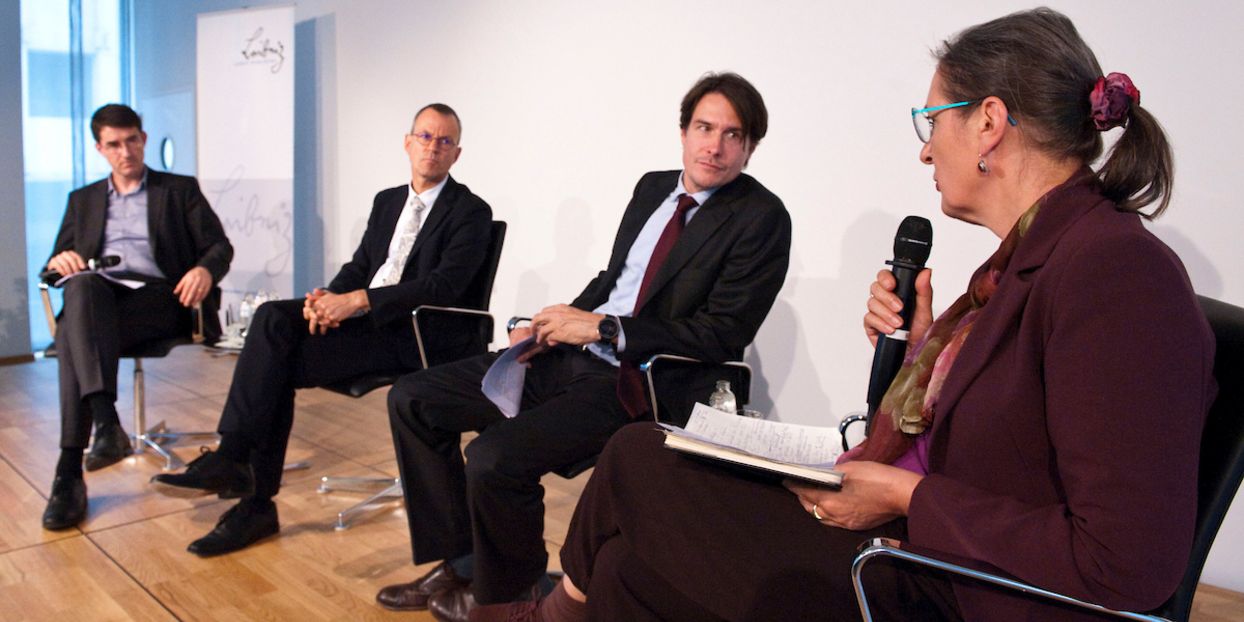
Humanitäre Krisen: Rollen, Verantwortlichkeiten und Risiken für Europa
Crisis Talk on 17 October 2017
Whether in Syria, Yemen, Southern Sudan or Nigeria, Europe's neighbours, both near and far, have been facing humanitarian crises time and again in recent years. In particular, the migration movements triggered or intensified by these crises have made them a central topic of European policy. The sixth Crisis Talk took this as an opportunity to ask what role and responsibilities the EU assumes in humanitarian crises. As with the first five Brussels Talks, many people again accepted the invitation of the Leibniz Research Network "Crises of a Globalised World" and its partners - the Representation of the State of Hesse to the EU, the European Office of the Leibniz Association and the Frankfurt Cluster of Excellence "The Formation of Normative Orders" - so that Prof. Dr. Tilman Brück (Leibniz Institue of Vegetable and Ornamental Crops), Dr. Nils Behrndt (Head of Cabinet of the EU Commissioner for International Cooperation and Development Neven Mimica), and Kathrin Schick (Director of the NGO European Network VOICE) were able to discuss in front of a full house what the EU could and had to do.
In his welcoming speech, Friedrich von Heusinger, the head of the national representation, not only emphasized the size and importance of the task, but also noted what Europe and its member states are already doing today. Tilman Brück, for his part, focused in his keynote speech on questions concerning the prerequisites for successful crisis policy. His thesis was that politics is successful precisely when it focuses on individuals and their immediate institutional contexts. He argued how great the economic differences between European states and the poorest countries in the world were and that these differences would not be reduced decisively in the foreseeable future, even with a large deployment of funds. At the same time, however, even extreme differences do not automatically mean that there will be large migratory movements. On the contrary, violence and war are often the trigger for flight; the question of where to flee to only arises afterwards. From this follows the importance of good institutions, the establishment of physical security and the creation of economic opportunities. Only when improvements are made in these areas will there be a chance to create an accepted and prosperous order in an unequal world. Using Syria, Kyrgyzstan and Niger as examples, Brück discussed how a focus on peace and stable institutions creates alternatives to a policy geared solely to emergency or development aid.
Kai Küstner, ARD radio correspondent in Brussels, moderated the subsequent panel discussion in which Nils Behrndt and Kathrin Schick took up Brück's theses from different perspectives. Behrndt pointed out, for example, that Europe has long recognised the need for a development policy that is as coherent as it is comprehensive. In contrast to public debate, the EU does not shy away from political responsibility, acts prudently and sustainably and has developed adequate policies for a variety of different crisis situations. The EU has come a long way in terms of a sustainable and conflict-reducing European foreign policy, and is by no means just a victim of the current media coverage. It is particularly important at present to convince the member states of the advantages of a common European policy, as this is the only way to ensure sustainability and effectiveness. Kathrin Schick countered this in her remarks by saying that in many crisis contexts, interests are more important indicators than values and that the EU must continue to work on an equal footing with civil society in order to meet its own demands and responsibilities. European development policy is often further developed than the general policies of the Union and it must be ensured that knowledge and strategies are also transferred to the next legislative period.
